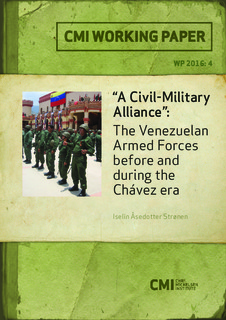“A Civil-Military Alliance”: The Venezuelan Armed Forces before and during the Chávez era
Working paper

Permanent lenke
http://hdl.handle.net/11250/2475209Utgivelsesdato
2016-05-01Metadata
Vis full innførselSamlinger
- Publications [1488]
Originalversjon
Bergen: Chr. Michelsen Institute (CMI Working Paper WP 2016:4)Sammendrag
Executive summary When Hugo Chávez (1954–2013) came to power in Venezuela in 1998, the military was bestowed with a new — and controversial — role in society. Being a former career military himself, a central tenant of Chávez’s political philosophy was to craft what was called a “civil-military alliance” ( una alianza cívica-militar ), expanding the military’s role and active involvement in the execution of public policies in the name of national development. This doctrine was underpinned by the political thinking of Simón Bolívar, the country’s national hero from the Wars of Independence. Concurrently, the Armed Forces were also attributed a more politicized role as the custodians of national sovereignty vis-à-vis foreign meddling in the country. Chávez died in April 2013, but the doctrine of a civil-military alliance has been kept alive under the presidency of his successor, Nicholas Maduro. The aim of this CMI Working Paper is to provide an overview of the ideological and political foundation for the approximation between the civilian politics and the military throughout recent Venezuelan history. The analysis will highlight the historical trajectories facilitating the military’s ideological alignment with “Bolivarianism” as articulated by the Chavez, and later, Maduro government, as well as the national and international realpolitik underpinning this approximation. In conclusion, and taking into account that Venezuela is in the midst of significant economic and political turmoil, I will briefly consider the role of the military at the current political juncture. Key words: Venezuela Armed Forces Civil-Military Relations Bolivarian Revolution Hugo Chávez Nicholas Maduro This CMI Working Paper is a publication from the project Everyday Maneuvers: Military–Civilian Relations in Latin America and the Middle East . The proj